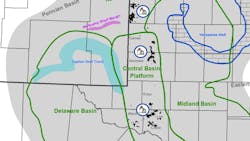Ring Energy aims to be "consolidation leader" in Central Basin Platform
Ring Energy Inc., The Woodlands, is looking to grow its production in the Central Basin Platform (CBP) both by acquisition and organically as it faces greater competition in the region sandwiched between the headline-grabbing Delaware and Midland basins.
Paul McKinney, chairman and chief executive officer of Ring, and his team 6 weeks ago completed the $100 million acquisition of oil-weighted CBP assets of Lime Rock Resources IV LP (OGJ Online, Feb. 26, 2025). That deal comprised about 17,700 net acres that last fall produced 2,300 boe/d (>80% oil) and have grown Ring’s total production by 12%. McKinney is interested in other purchases like that of Lime Rock, which made Ring the fourth-largest producer in the CBP.
“I’d like for Ring to be the consolidation leader of the Central Basin Platform in the southern part of the shelf,” McKinney said Apr. 1 in a conversation with Jeff Robertson, a managing director at Water Tower Research. “We know these areas very, very well. I am convinced that many of the stacked plays that are […] not being pursued, they demonstrate real promise.”
McKinney told Robertson Ring has been able to take the exploration and development technologies refined by large industry players in the Delaware and Midland and adapt them to the CBP’s conventional zones. That, he said, helped the company grow its overall reserves by 3% in 2024—while net production grew to nearly 20,000 boe/d (66% oil) in the fourth quarter—and helped offset the lack of an acquisition last year.
Ring missed out on several deals, McKinney said, because its leaders weren’t willing to pay the high prices being demanded and proposed. He added that he thinks last summer’s prices were “a high-water mark” for CBP transactions and is eyeing operators that aren’t pursuing newer fracturing techniques to add to Ring’s portfolio—even as more competitors are stepping into the arena.
“We’re trying to negotiate our way to acquire more before the whole industry catches on and then the Central Basin Platform becomes as popular as the Delaware and Midland,” McKinney said. “It’s apparent now that it’s not just us. The competition is getting a little bit stiffer but we have the advantage of [having] operated out there for a long time […] We’ll get our elbows up. We’ll be competing really hard.”
Shares of Ring (Ticker: REI) were changing hands around 94 cents in early-afternoon trading Apr. 7, down slightly from where they ended the previous week. Over the past 6 months, shares have lost about 40% of their value, a slide that has cut the company’s market capitalization to about $190 million.
About the Author
Geert De Lombaerde
Senior Editor
A native of Belgium, Geert De Lombaerde has more than two decades of business journalism experience and writes about markets and economic trends for Endeavor Business Media publications Healthcare Innovation, IndustryWeek, FleetOwner, Oil & Gas Journal and T&D World. With a degree in journalism from the University of Missouri, he began his reporting career at the Business Courier in Cincinnati and later was managing editor and editor of the Nashville Business Journal. Most recently, he oversaw the online and print products of the Nashville Post and reported primarily on Middle Tennessee’s finance sector as well as many of its publicly traded companies.

